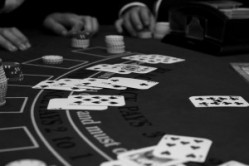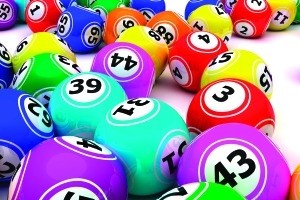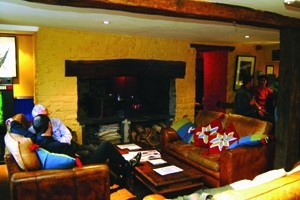How to... Set up a pub poker school

Pub poker, in which only small stakes are allowed, counts as entertainment as much as gambling — but the prospect of winning a major prize through the league system is a big draw.
Redtooth has more than 1,000 pubs on its books hosting Texas Hold’em, and in the past 12 months has attracted more players by increasing the opportunities to win. It now hosts 18 regional finals four times a year, and takes 100 people to the national showdown in Las Vegas.
Like a lot of pubs, Greene King’s Cuckoo Pint, in Fareham, Hampshire, entrusts the running of its Redtooth poker night to an enthusiastic regular, in this case Gordon Day.
"We’ve been doing it for four or five years and have 22 to 26 players across three tables every week," he says.
"We have it on a Tuesday evening, which is the quietest night when having 20-odd people in the pub really helps create an atmosphere and one that means other people come in and want to stay."
Watch a video from Poppleston Allen about the legal limits of poker in pubs
Champions Poker League
Champions Poker League has been going eight years and has 200 pubs taking part. It hosts 11 area finals and offers £100,000 in cash prizes each year. Pubs can pay a flat fee of £20 a week or £1.50 plus VAT per player, to make it more affordable for newcomers to get started.
At least 50 people take part each week in the Champions poker league at the Tydd Gote Inn, near Wisbech, Cambridgeshire.
"We’ve been running every Thursday for a couple of years,” says Enterprise Inns tenant Sara Warrington. "We started with eight people and it took off. People come from a 20-mile radius. We had to move the tables into the restaurant because there wasn’t enough room in the bar.
"We break for half an hour for a free meal, and have a member of staff dedicated to table service. As a result, we’ve seen a rise in drinks sales of 70% on Thursdays, mostly soft drinks with a good margin, because most players have to drive to get here."
Legal Q&A: Pub poker
When can customers play poker in a pub?
■ In premises that benefit from an on-premises alcohol licence.
■ In premises with a bar at which alcohol is served for consumption on the premises (there’s no requirement that alcohol is served only with food).
■ At a time when alcohol may be supplied in reliance on the alcohol licence.
Or in other words, customers can play poker in pubs at times when alcohol can legally be served.
One further condition is that the poker is not linked to poker played on another premises. For instance, there cannot be an electronic link between two premises with all the players playing in the same game.
What are the stake and prize limits?
■ Maximum stakes per person per game — £5.
■ Maximum aggregate total of stakes per premises per day — £100.
This requires you to keep track of the amount of the customer’s stake and the total stakes for the pub each day. This is easy to achieve if players pay for chips prior to the game and you control limits on re-buys etc.
Limits on prizes:
■ £100 per game.
No money may be charged by the pub for players to participate. There can be no deduction, rake or levy from the stakes or prizes. All the stakes must go back to the players as prizes and therefore the pub cannot make any money from the gambling. Money can be made from the extra sale of drink and food.
Who can play?
Under 18s are not allowed to play poker in pubs.
Gambling Commission code of practice
The code of practice advises that the designated premises supervisor (DPS) should be responsible for compliance with the code and ensuring that the poker stays within the law.
The code gives more detail about the operation of the poker and age verification, and makes suggestions on the equipment to be used. The code actually recommends that cash poker is not played as it is more difficult to manage. According to the code, the DPS should keep a record of the games played, number of players, and amounts staked, to ensure that the individual and daily limits are not exceeded. The DPS must also ensure that the games are played in a ‘pleasant atmosphere’.
Compliance with the code is recommended as it is best practice, as suggested by the Gambling Commission, but it is not a legal requirement. Visit its website for more information.
How to play a winning hand
- If space allows, set up your tables in a visible part of the pub. It helps create an atmosphere and can encourage new players.
- Offer table service — poker players don’t like to leave the game but will order drinks if you come to them.
- Advertise your poker night around the pub using the posters provided by league organisers.
- Talk to customers about the poker and encourage them to have a go, or offer a free drink to a player who brings a friend along.
- Make use of the law allowing you to play for small stakes by offering cash prizes on the night.
- Meal vouchers also make good prizes, which will get players back into the pub on another night with their family or friends.
- Place a bounty on the head of last week’s winner or league leader by giving extra chips to whoever takes him or her down.
- Vary the format to keep up interest, perhaps by organising players into teams or giving them bigger chip stacks.
- Don’t forget food — break for a hot dish or serve dips and nibbles during play.







